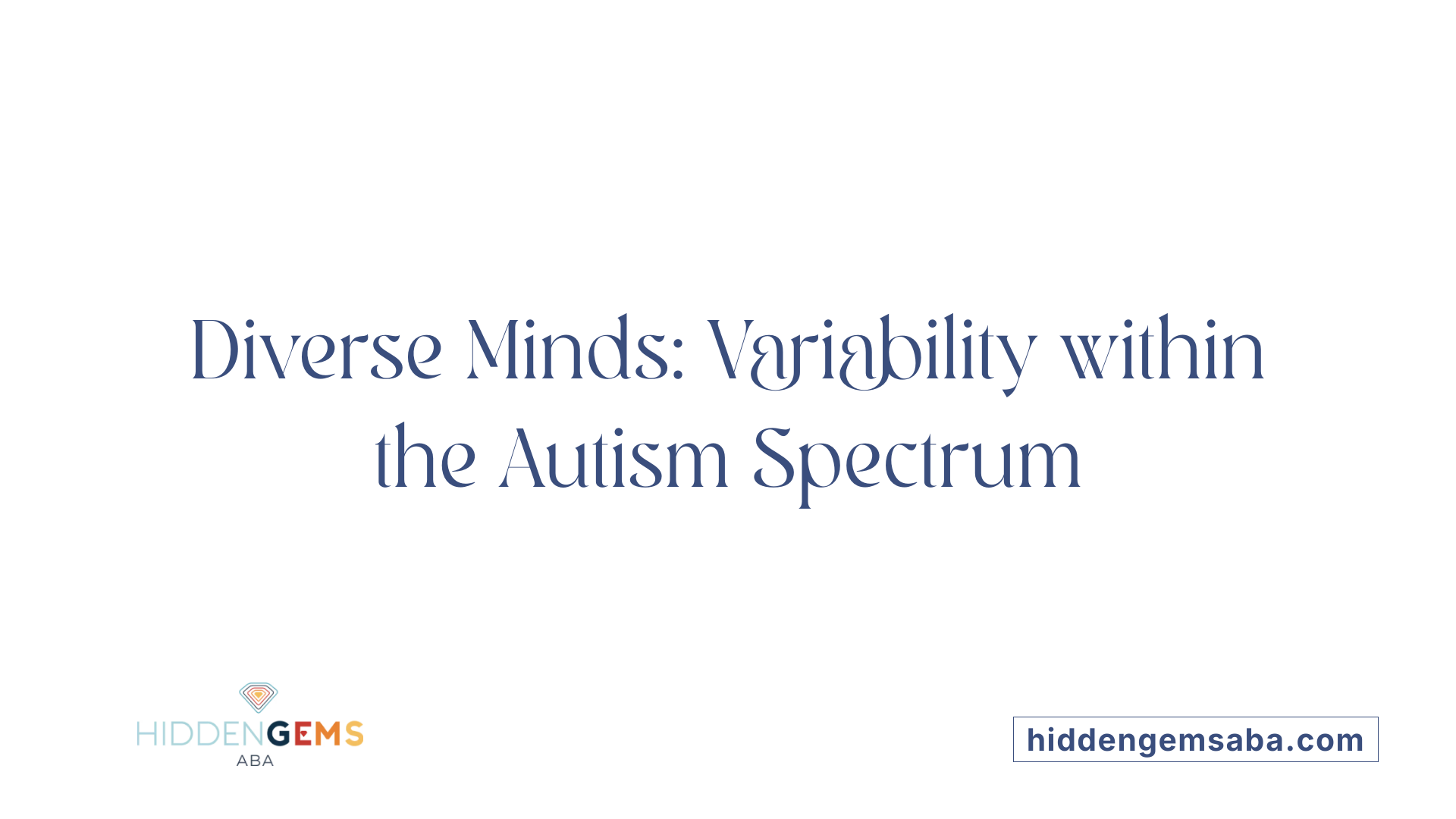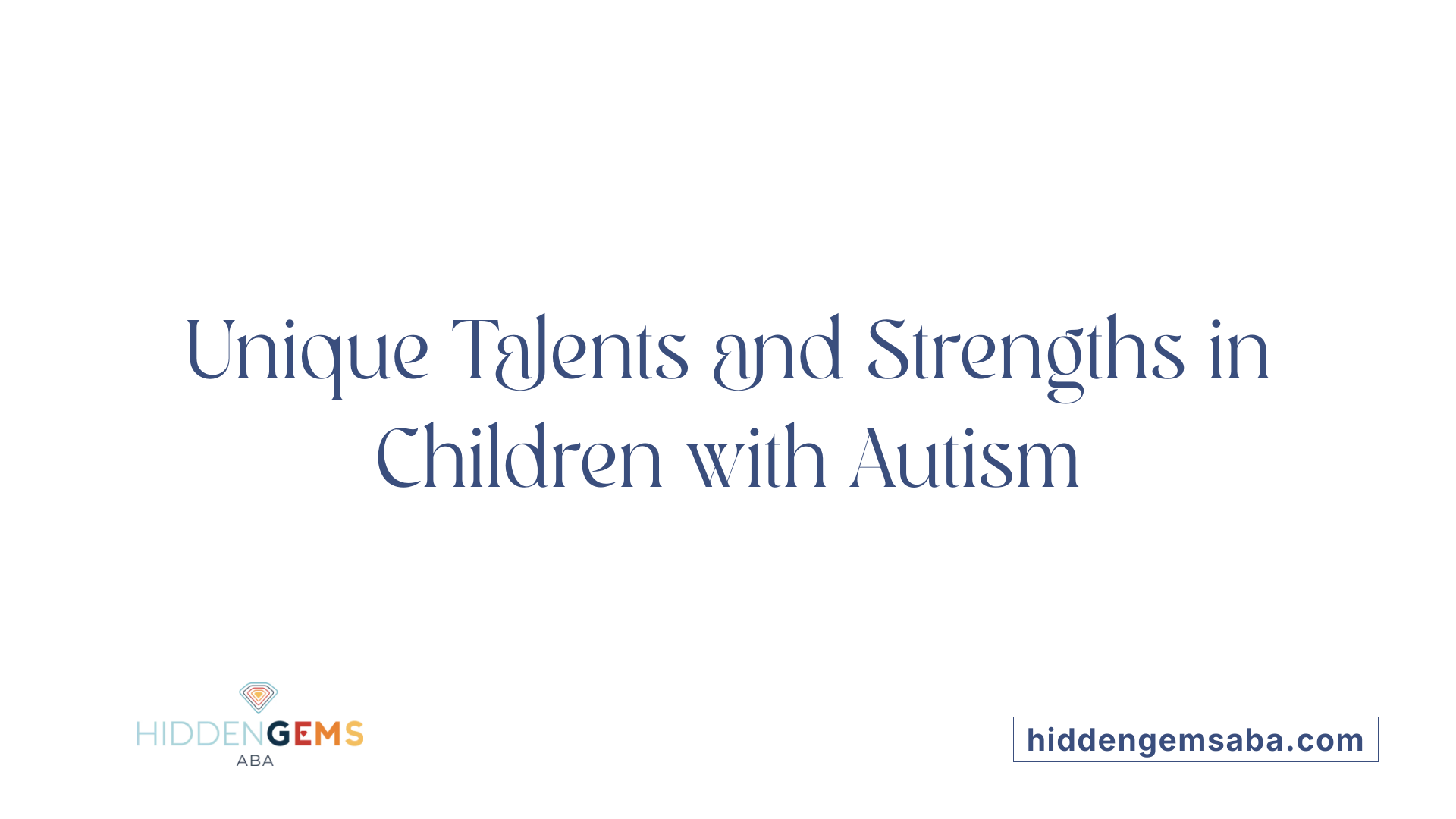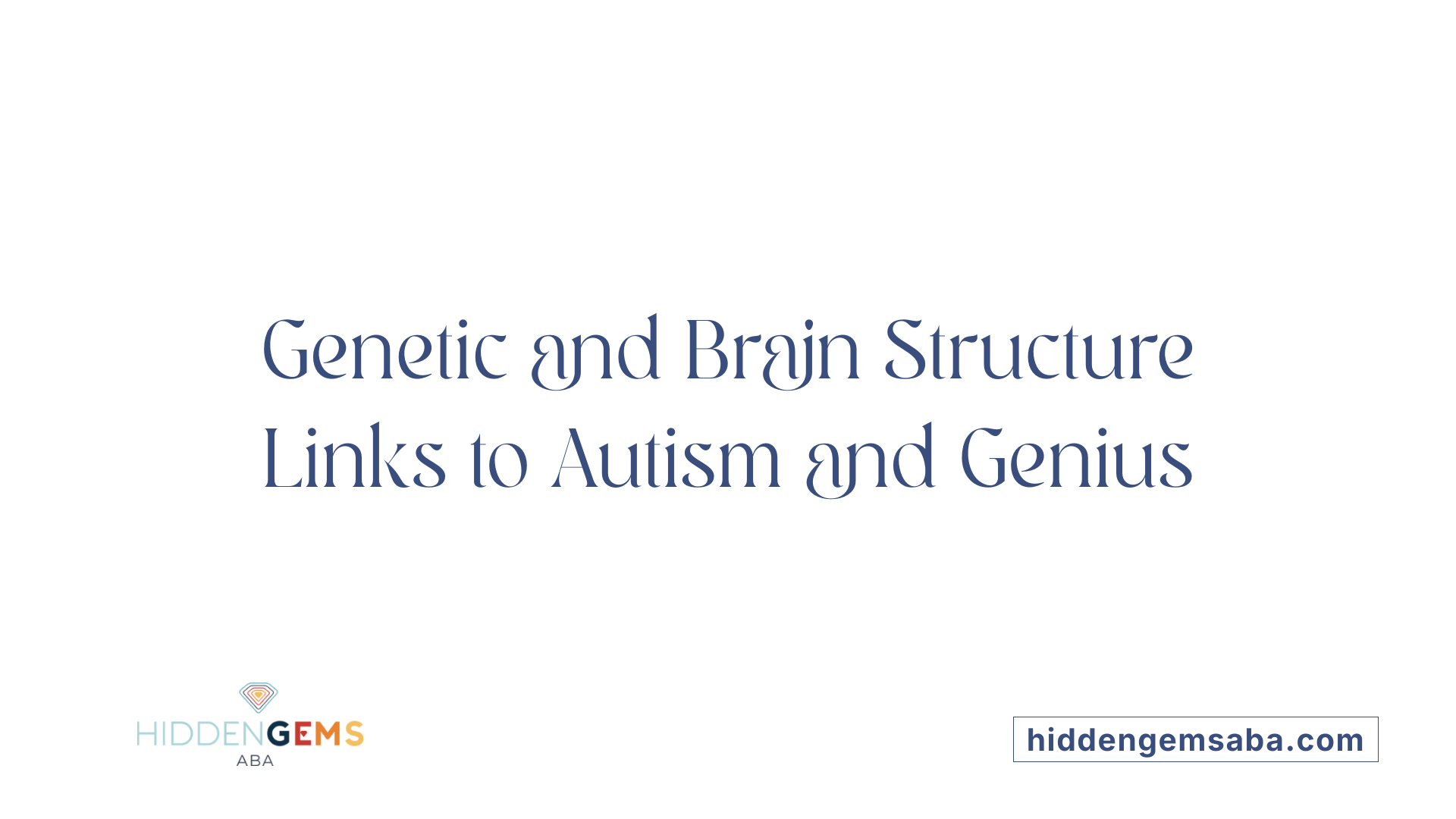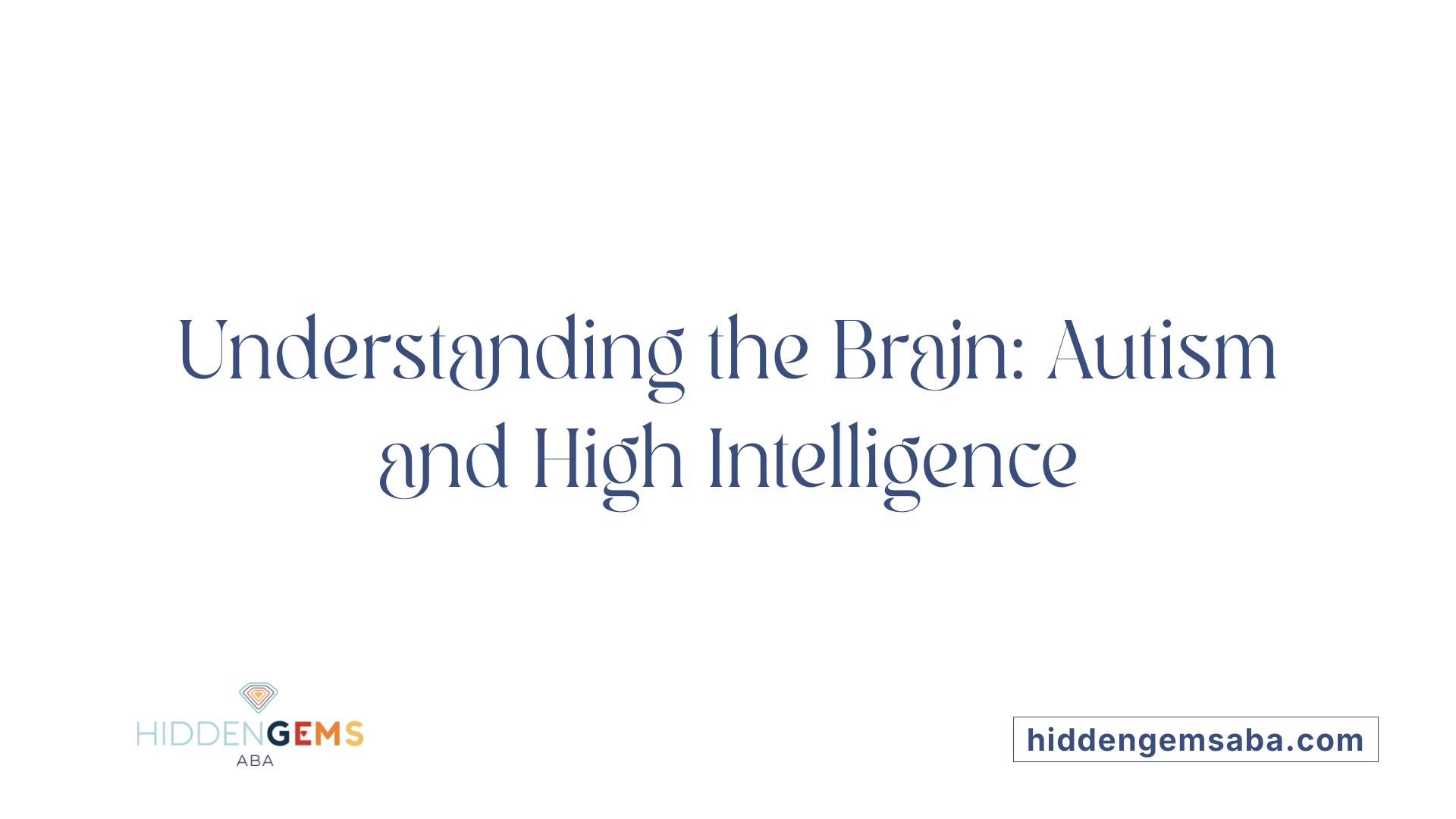Understanding the Spectrum of Intellectual Abilities in Autism
Autism Spectrum Disorder (ASD) is widely known for its diverse presentations, especially in terms of cognitive abilities. This article explores the relationship between autism and intelligence, shedding light on how individuals with ASD can be highly intelligent, and examining the unique cognitive profiles that characterize this spectrum.
Inherent Variability Within the Autism Spectrum

Can individuals with autism be highly intelligent or have high IQs?
Many individuals on the autism spectrum exhibit a wide range of cognitive abilities, with a significant portion demonstrating high intelligence. Research suggests there is a strong link between autism and elevated intellectual skills, especially among those with savant talents and high-functioning autism.
Genetic studies support overlapping alleles associated with autism and high intelligence. For instance, certain genes that increase autism risk are also connected to higher IQ, superior visual-spatial skills, and advanced reasoning abilities.
The distribution of IQ in the autistic population is not uniform. Many studies highlight a bimodal pattern, with groups of individuals having below-average IQs and others with above-average or gifted levels. Data shows that about 59% of individuals meeting broad autism criteria and with IQ data available have an average or higher IQ, indicating a substantial representation of high cognitive functioning.
Advances in assessment tools are enhancing our understanding of intelligence in autism. Traditional IQ tests may sometimes underestimate abilities in autistic individuals, particularly because they often do not fully capture the unique cognitive profiles typical of autism.
Autistic individuals often excel in areas like detailed perception, memory recall, problem-solving, and sustained focus. These strengths contribute to higher performance in specific domains and sometimes translate into extraordinary talents.
While autism can include challenges in social communication and sensory processing, it can simultaneously involve heightened perceptual and intellectual abilities. This combination creates a diverse spectrum where high intelligence is more common than previously believed.
Overall, the understanding of intelligence within autism continues to evolve, emphasizing the importance of personalized assessment and recognizing the diverse cognitive profiles across the spectrum.
| Aspect | Description | Additional Notes |
|---|---|---|
| IQ Distribution | Bimodal, with many individuals at either end | Includes both lower and higher IQ groups |
| Genetic Links | Overlap between autism risk genes and high intelligence | Genetic research supports shared pathways |
| Cognitive Strengths | Visual-spatial reasoning, memory, focus | Often related to sensory processing and attention |
| Testing Challenges | Standard IQ tests may underestimate ability | New assessments aim for better accuracy |
| Spectrum Variability | Wide range from challenges to giftedness | Reflects diverse neurodevelopmental profiles |
Recognizing the variation in cognitive abilities among those with autism highlights the importance of personalized evaluation and support, emphasizing strengths alongside challenges.
Cognitive Strengths and Talents in Children with Autism

What are the characteristics and potential intelligence levels of children with autism?
Children diagnosed with autism spectrum disorder (ASD) display a broad spectrum of cognitive abilities. Some children face significant intellectual challenges, while others are highly intelligent and exhibit exceptional talents in specific areas.
Research shows that nearly half of children with ASD—about 44%—have an IQ score of 85 or higher, which is considered average or above average. Conversely, around 25% of these children fall into the borderline IQ range of 71–85. This indicates a bimodal distribution, where some children have lower cognitive scores, and others demonstrate remarkable intellectual capacities.
The variability is also influenced by factors like language skills, the type of IQ test administered, and individual behaviors during assessments. As a result, evaluating intelligence in children with ASD can be complex. Despite the diversity in IQ levels, many children with autism possess unique strengths that go beyond traditional intelligence measures.
These strengths include exceptional memory, intense focus, and heightened perceptual abilities. Some children may excel in visual-spatial tasks, pattern recognition, or detailed observation. Their ability to concentrate intensely on specific interests often leads to advanced development in chosen areas.
Overall, cognitive functioning in children with ASD varies widely. While some struggle with traditional academic tasks, others may demonstrate extraordinary talents and skills, highlighting the importance of individualized assessment and support.
Genetic and Neurological Underpinnings of High Intelligence in Autism

Is there a relationship between autism and intelligence, including high-functioning autism?
Recent research increasingly underscores a significant connection between autism and higher levels of intelligence. Genetic studies have identified overlaps in genetic variants associated with both autism and intelligence measures such as IQ, educational attainment, and verbal reasoning. Many alleles linked to autism risk are also correlated with enhanced cognitive abilities, especially in perceptual and visual-spatial domains.
Autistic individuals display diverse cognitive profiles. Some demonstrate extraordinary talents, known as savant skills, and heightened sensory and perceptual abilities. For example, many have exceptional memory recall, visual discrimination skills, and focus, which can lead to advanced skills in art, music, mathematics, and other areas requiring intense attention to detail.
Brain structure differences also support these cognitive strengths. Autistic individuals tend to have increased brain size during early childhood, along with rapid brain growth and distinctive connectivity patterns. These include increased local connectivity that enhances perceptual processing and decreased long-range connectivity that may influence social and communication challenges.
Overall, the evidence suggests autism isn't solely characterized by deficits but also encompasses high and uneven components of intelligence. This includes a spectrum where some individuals are highly gifted while others face cognitive challenges. The evolving understanding highlights autism as a complex neurobiological condition intertwined with sophisticated neural architectures that foster unique cognitive strengths.
This complex interplay of genetic and neural factors explains why a significant portion of individuals with autism, sometimes over 40%, possess IQ scores in the average or above-average range. As research advances, the view of autism continues to shift from a disability-focused perspective towards recognizing its diverse cognitive capabilities, especially in those with high-functioning autism.
Scientific Perspectives on Autism and High Intelligence

What does scientific research say about the coexistence of autism and high intelligence?
Recent scientific studies provide compelling evidence that autism spectrum disorder (ASD) can occur alongside high intelligence. Data indicates that nearly half of individuals diagnosed with ASD have an average or above-average IQ, challenging earlier assumptions that autism predominantly correlates with cognitive challenges.
Research highlights that the spectrum nature of autism includes a wide range of abilities. Some children and adults with ASD possess extraordinary talents—particularly in areas like memory, visual perception, and focus—which often mask their social and communication difficulties.
Advanced neuroimaging and genetic studies shed light on the biological roots of this overlap. For example, many genes linked to autism risk are also associated with higher intelligence measures, such as verbal reasoning and educational achievement. Brain structure analyses reveal that increased brain size and rapid early brain growth are common in both high-IQ and autistic individuals.
Despite these positive correlations, some studies point to increased mental health risks among highly intelligent autistic individuals. Factors such as heightened self-awareness and social difficulties may contribute to stress, anxiety, and even suicidal ideation. This underscores the importance of nuanced diagnosis and tailored support.
These findings underscore that high cognitive ability is prevalent within the autism population. This reality influences diagnostic strategies, educational planning, and support systems, emphasizing the need for personalized approaches that leverage individuals’ strengths while addressing their challenges.
How do neuroimaging and genetic studies support these findings?
Neuroimaging reveals that autistic individuals often exhibit increased local connectivity and heightened perceptual functions, like visual discrimination. These neural features contribute to superior skills in specific areas and are associated with 'intense interests' that can lead to advanced development.
Genetic research demonstrates overlapping genetic markers between autism and high intelligence. Many specific alleles increase the likelihood of both conditions, highlighting shared biological pathways. Conversely, conditions like schizophrenia generally show a negative correlation with intelligence, making autism's positive association distinctive.
What are the implications for diagnosis and support?
Given this complexity, diagnostic criteria are evolving. The term 'high-functioning autism,' while widely used, is unofficial and can be misleading. Modern diagnostics focus on support needs rather than intelligence levels alone. Recognizing the diversity within ASD means providing tailored interventions that strengthen abilities and mitigate difficulties.
Educational and therapeutic programs are increasingly designed to harness strengths like exceptional memory and focus, benefiting those with high IQs. Support strategies should also address mental health risks, ensuring comprehensive care.
In summary, the landscape of autism and intelligence is nuanced. Scientific research reinforces that high intelligence can be an integral part of the autism spectrum and should inform compassionate, individualized approaches to diagnosis and support.
| Aspect | Details | Additional Notes |
|---|---|---|
| Prevalence of high IQ in ASD | Nearly 50% of ASD individuals have above-average IQ | Varies with sample and diagnostic criteria |
| Biological links | Overlapping genetic markers and brain structural differences | Faster early brain growth, increased local connectivity |
| Strengths | Exceptional memory, visual-spatial skills, intense focus | Can aid in specialized learning and careers |
| Challenges | Social interaction difficulties, mental health risks | Support and interventions are crucial |
| Diagnostic shifts | Moving away from terms like 'high-functioning autism' | Focus on support needs and strengths |
Assessment, Diagnosis, and Support for Autistic Individuals with Diverse IQs

How are individuals with autism and varying IQ levels assessed, diagnosed, and supported?
Autism diagnosis involves comprehensive evaluations that take into account developmental history and behavioral patterns. Clinicians typically use established tools such as the Autism Diagnostic Observation Schedule (ADOS-2) and the Autism Diagnostic Interview-Revised (ADI-R) to gather detailed information about social interaction, communication skills, and behavioral tendencies.
Since autism can present quite differently depending on an individual's cognitive level, assessments also include tests to determine intellectual functioning. These often involve standardized IQ tests like the Wechsler scales or the Mullen Scales of Early Learning. It's important to recognize that IQ scores can fluctuate over time and may not fully capture an individual's abilities or challenges.
Evaluating adaptive functioning — the skills needed for daily life — helps provide a fuller picture of a person's abilities. Sometimes, individuals with high IQs and autism might excel in certain areas like memory or visual perception but still encounter difficulties with social skills or routines.
Support strategies are highly personalized. They are designed based on a combination of cognitive assessments and individual behavioral needs. Interventions can include behavioral therapies, speech-language therapy, occupational therapy, and social skills training.
Furthermore, support plans adapt over time as needs evolve, which is crucial given the spectrum nature of autism. Continuous assessment ensures that interventions remain relevant and effective. This tailored approach helps maximize each person's strengths while addressing specific challenges, regardless of IQ level.
In summary, diagnosing and supporting autistic individuals requires a nuanced, individualized approach that considers the full range of cognitive and behavioral profiles to optimize development and quality of life.
Impact of Accurate Diagnosis and Tailored Interventions
How are individuals with autism and varying IQ levels assessed, diagnosed, and supported?
Assessing individuals with autism requires thorough and nuanced evaluation methods. Clinicians utilize a combination of developmental history, behavioral observations, and standardized diagnostic tools such as the Autism Diagnostic Observation Schedule (ADOS-2) and the Autism Diagnostic Interview-Revised (ADI-R). These assessments help identify the core features of autism.
To determine cognitive functioning, IQ testing is also conducted with instruments like the Wechsler scales or Mullen Scales. Since autism manifests differently across individuals, IQ profiles can vary widely. Some may show exceptional talents or high cognitive abilities, especially in specific areas like visual reasoning or memory, whereas others might face more significant challenges.
It is important to recognize that IQ scores can fluctuate over time and may not fully capture an individual's strengths or difficulties. Adaptive functioning—how well a person manages daily life skills—also factors into diagnosis, providing a clearer picture of their capabilities and needs.
Once assessments are complete, support strategies are customized to each individual. Interventions may include behavioral therapies to improve social skills, speech therapies to enhance communication, and occupational therapies to develop life skills. For those with exceptional abilities, tailored educational programs can help nurture their talents.
Accurate diagnosis and ongoing evaluation are fundamental. Given autism's spectrum and the range of cognitive abilities, continuous reassessment ensures support remains relevant and effective. This personalized approach not only enhances learning and development but can significantly elevate quality of life for autistic individuals.
Towards a More Nuanced Understanding of Autism and Intelligence
Recognizing the diversity of cognitive profiles within autism reshapes our approach to diagnosis, support, and societal perceptions. Understanding that many individuals with autism are highly intelligent underscores the importance of tailored interventions and respectful acknowledgment of their strengths. As research continues to evolve, promoting awareness of the rich cognitive landscapes within the spectrum fosters a more inclusive and supportive environment for all.
References
- Autistic Genius: Is Autism Associated with Higher Intelligence?
- What Makes Children with Autism Exceptionally Intelligent?
- Average or high IQ in individuals with ASD may be higher than ...
- High-Functioning Autism: What Is It and How Is It Diagnosed?
- Autism As a Disorder of High Intelligence - PMC - PubMed Central
- Autism Spectrum Disorder and IQ – A Complex Interplay - PMC
- Intellectual Profile of Children with Autism Spectrum Disorder
- Measuring Intelligence in Autism | Kennedy Krieger Institute
- Gifted, On the Spectrum, or Both? - Davidson Institute






